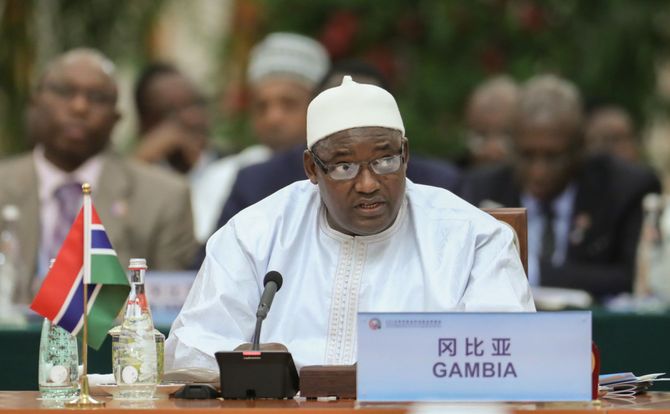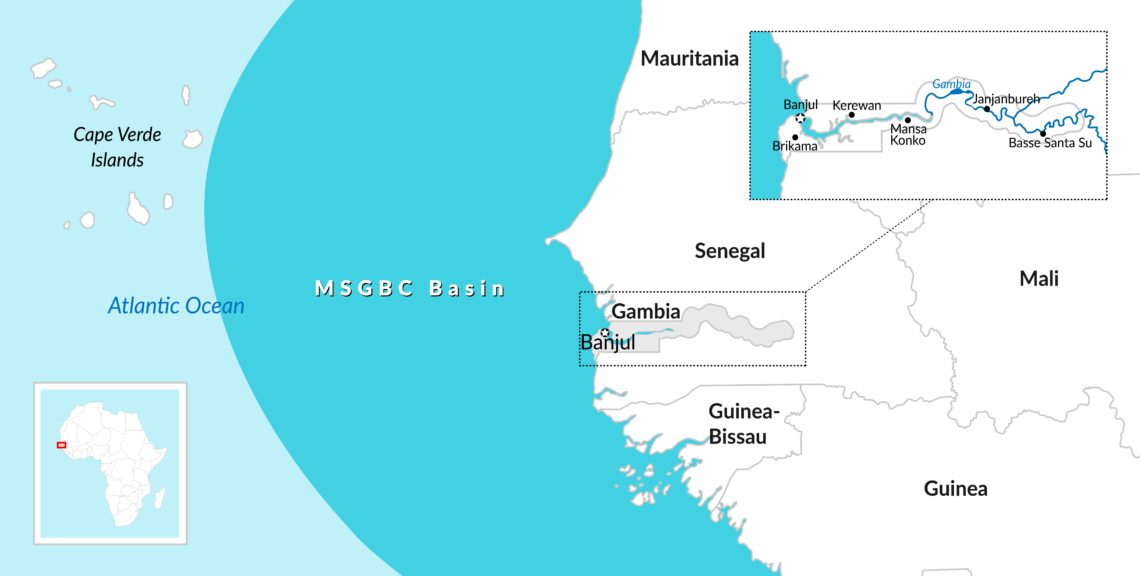The Gambia’s critical moment
Two years ago, The Gambia managed to oust a dictator. Now its president, Adama Barrow, must decide whether to honor an agreement to stay in power for only three years or serve out his constitutionally guaranteed term of five years. Both options pose risks for this West African state just getting back on its feet.

In a nutshell
- Gambia’s new president has taken positive economic and political steps
- It will take time before ordinary Gambians reap the benefits of those reforms
- The country is in a fragile position, where several factors could lead to instability
For 22 years, The Gambia was under an authoritarian regime: a dictatorship sustained by patronage and state violence. Though nominally “democratic,” the country’s elections – sometimes held more freely, sometimes less – were, more than anything, a ritual designed to legitimize the government.
The 2016 ballot, however, was different: President Yahya Jammeh was voted out of office. The Gambia suddenly became an exception in Africa, where dictators seldom leave power through conventional methods. President Jammeh’s defeat was the result of a specific combination of factors.
First, the final year of his rule was marked by increasing repression (including the imprisonment of opposition members, some of whom died in custody) and the adoption of extreme measures, such as unilaterally declaring The Gambia an “Islamic republic.” He threatened to eliminate the Mandinka ethnic group, which makes up some 40 percent of the population.
Second, the opposition rallied around a single candidate – the first time it had been so united since President Jammeh had come to power in 1994. The diaspora formed strategic alliances with the opposition, spread news of the abuses committed by the regime and lobbied other countries and international organizations for regime change.
Finally, President Jammeh weakened his ability to manipulate the election by agreeing to on-the-spot vote-counting and the instant publication of results.
High expectations for political, social and economic improvement were set when President Jammeh was ousted.
Adama Barrow, the leader of the opposition Coalition 2016, won the December presidential elections with 43 percent of the vote to President Jammeh’s 40 percent. A former treasurer of The Gambia’s main opposition party – the United Democratic Party (UDP) – Mr. Barrow was a real estate developer and political outsider. Yet with UDP founder and leader Ousainou Darboe in prison, the coalition parties united behind him.
After initially accepting defeat, President Jammeh changed his mind and rejected the results, calling for “fresh and transparent” elections. The deadlock was overcome by two factors: strong internal resistance and the firm position of the Economic Community of Western African States (ECOWAS), which established a military force tasked with intervening. In January 2017, the force entered The Gambia and blockaded the country. President Jammeh was forced to negotiate his departure and seek refuge in Equatorial Guinea, which is not party to the Rome Statute of the International Criminal Court. The ECOWAS contingent has remained in The Gambia, helping to maintain stability.
Politics: Delicate phase
Two years later, Adama Barrow has had some important political successes. According to Freedom House’s 2019 Freedom in the World report, The Gambia was among the world’s most-improved countries in 2018 for political rights and civil liberties. Political prisoners were released, President Jammeh’s decision to withdraw from the ICC was reversed and the 2017 legislative elections went smoothly, with the UDP winning 31 of the 53 seats and several new parties and independent candidates entering the National Assembly. This process of political opening was important for the country’s reintegration into the international sphere: The Gambia rejoined the Commonwealth and normalized its relations with the European Union, which vowed to become “a privileged partner of the new Gambia.”
Despite these achievements, the country is now going through a delicate phase. According to the coalition agreement President Barrow signed, he is supposed to serve only three years, though the constitution sets the president’s term at five. If he decides to honor that agreement, he has only one more year in office, and much remains on his plate. High expectations for political, social and especially economic improvement were set after President Jammeh’s ouster. President Barrow must work to meet those while managing a potentially divided coalition, maintaining the loyalty of crucial institutions like the military and implementing reforms, including amending the 1997 constitution.
The unstable political context may serve as justification for President Barrow to breach the coalition agreement.
The Gambia’s unstable political context may serve as justification for President Barrow to breach the coalition agreement. If he does, though, it will provide fuel for his political opponents when elections come in 2021.
Economy: Risks and opportunities
When President Barrow came to power, the Gambian economy was devastated after two decades of mismanagement. President Jammeh had built a monopoly over state resources. Growth was stifled by inefficiency, corruption and the flight of capital and skills. As Mr. Jammeh’s rule came to an end, drought and political instability hurt agriculture and tourism, which account for 30 percent and 20 percent of the country’s gross domestic product (GDP), respectively. In 2017, according to International Monetary Fund data, the country’s debt-to-GDP ratio was 120 percent.
The end of the Jammeh dictatorship and the political opening that followed, however, created strong economic momentum. The Gambia reengaged with regional partners and international creditors, benefiting from a general sense of goodwill among donors.
Relations with the IMF have resumed with the negotiation of a three-year extended credit facility program. The United States lifted The Gambia’s suspension from the Africa Growth and Opportunity Act (which opens the U.S. market to imports from sub-Saharan African countries), and the EU has announced the unfreezing of $36 million in aid funding. In 2018, a donor conference co-hosted by the EU and The Gambia resulted in pledges of 1.45 billion euros to help implement the country’s 2018-2021 National Development Plan. These changes are taking place at a time when the economic outlook is rosy for Africa generally and for West Africa in particular, reflecting a recovery in commodities prices and growing integration at the regional and subregional levels.
Facts & figures
The Gambia: A fragile recovery

According to the African Development Bank’s 2019 African Economic Outlook, growth is being driven by services – especially tourism, trade and financial services. Tourism, which provides jobs for some 19 percent of the Gambian workforce, is a key sector in a country where youth unemployment is extremely high. The increase in regional trade, especially with neighboring Senegal, is also expected to boost growth. After decades of delays, the Senegambia Bridge – connecting the northern and southern parts of The Gambia and Senegal – was recently opened, dramatically reducing travel times.
Another crucial challenge is managing migration. While The Gambia’s population is estimated at only about 2.1 million, the country has one of the highest migration rates in Africa. According to data from the International Organization for Migration (2017), about 9.8 percent of Gambians have migrated abroad. Gambians rank among the top five nationalities taking the Central Mediterranean Route from Libya to Italy. Remittances account for 22 percent of the country’s GDP.
Though political change has created high expectations that the country will manage to stem migration (especially to the EU), the push and pull factors remain the same: Gambians migrate for economic reasons. It will take time for the positive effects of reintegration and reforms to be felt among the population. Food prices remain high, job opportunities scarce and public services poor. The country continues to have high levels of debt and public spending.
In this fragile context, a new factor has emerged: offshore oil exploration. This industry presents opportunities and risks for the country’s economic outlook. The Gambia’s position within the MSGBC Basin, one of the largest oil and gas deposits in Africa with at least 11 successfully drilled wells since 2014, has raised expectations among investors. So far, oil has not been found in The Gambia’s portion of the basin. However, Australia-based FAR Limited, which is leading exploration efforts, estimates the country has “multibillion-barrel potential.”
Scenarios
Despite successes on the political and economic fronts, The Gambia remains in a fragile position. While the steps taken toward political opening, reintegration and economic reform were necessary, they are not sufficient to guarantee a successful political transition and sustainable economic growth. In this context, three scenarios must be considered.
Short-term thinking compromises growth
Under this most likely scenario, after an initial push toward structural reforms, policymakers would start focusing on short-term gains. This change would be prompted by two internal factors. First, President Barrow will find it difficult to meet the high expectations created by regime change. The costs of previous mismanagement are still being felt, and it takes time for the benefits of the reforms to kick in. Second, as he comes under increasing pressure to leave office after a three-year mandate, the president will focus on consolidating power rather than implementing reforms.
This scenario could be triggered by two other events: the withdrawal of the ECOWAS force (which is funded by the EU) or the discovery of offshore oil reserves. Either could lead to hasty economic decisions or create additional competition for power.
Successful transition unlocks high growth
Under this slightly less likely scenario, after a successful transition, The Gambia would enter a period of political stability and fast growth. Adama Barrow would be able to generate a consensus within the UDP and, fearing instability and the interruption of crucial reforms, the other parties that formed the 2016 coalition would accept a five-year mandate. This scenario presupposes continued growth (equal to or better than the African Development Bank’s forecast of 5.4 percent for 2019), driven by macroeconomic reforms, an improved business environment, improving electricity supplies and rapid expansion of services and agriculture.
This scenario presupposes regional stability. Western Africa has become a relatively stable region with some of the continent’s strongest democracies. Peaceful handovers of power are becoming the rule rather than the exception. All of this will help smooth The Gambia’s transition. Under this scenario, the country would also benefit from the goodwill of international creditors and donors, including the EU, which sees The Gambia as an important partner on migration.
Political instability
A third scenario, while highly unlikely, could figure in the short term. Its occurrence depends on an improbable combination of factors. These include instability following an attempt by President Barrow to extend his mandate, along with a possible resurgence by supporters and allies of former dictator Yahya Jammeh. Mr. Jammeh’s political party, the Alliance for Patriotic Reorientation and Construction, won 15.9 percent of the vote in the 2017 National Assembly elections. Frustration with unmet public expectations for the political transition would also have to grow acute enough to drive people out into the streets.
Even then, this worst-case scenario could not be realized unless the regional political and security outlook deteriorates. Otherwise, regional powers such as Nigeria and Senegal would likely intervene to avoid The Gambia backsliding into another despotism.







